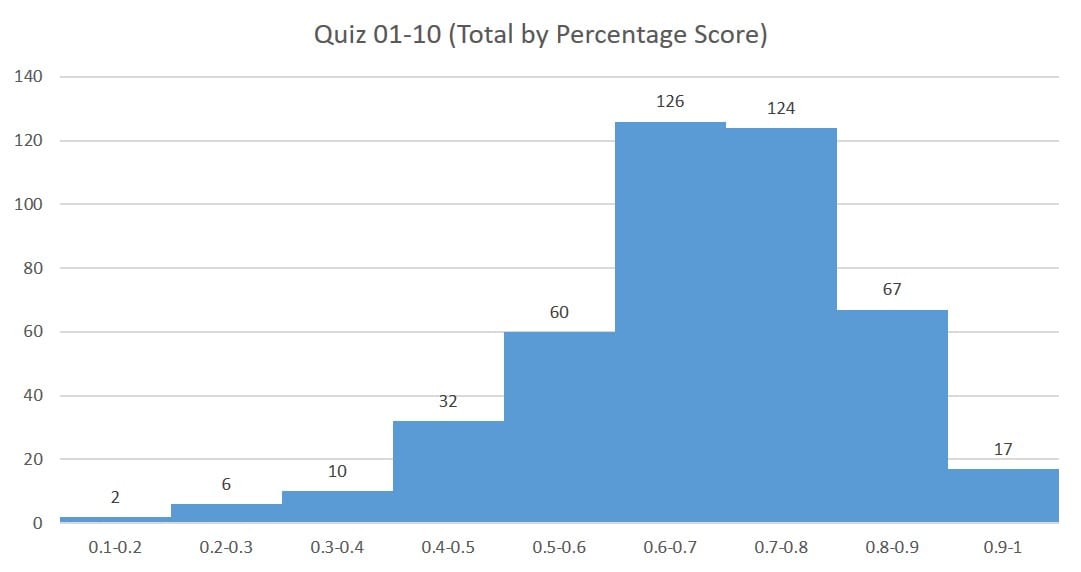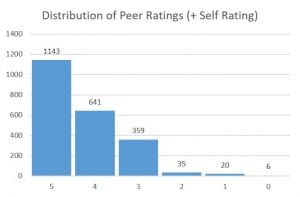By design, the Special Project component of the module has a constrained significance when it comes to grade differentiation. This constraint is not fully captured by the fact that the Project is worth 12%, as opposed to 36% for the Quizzes and 40% for the Final Exams. While 12% is the equivalent of three quizzes, there are additional mechanisms to reduce the typical impact on overall grades.
Life, the Universe, and Everything
A Course Blog for GET1029/GEK1067
Month: November 2018
I will be brief for most of the questions. And, as announced, I won’t be posting the questions since you were allowed to take them out of the exam hall (so please don’t email me to ask for them).
On second thoughts, I will be discarding both Question 3 and Question 21 (see my explanations below). Consequently, the final exam will be upon 28 marks, for 40% of your final grade. (For an explanation of the practice, see this.)
I originally didn’t want to release the percentiles, but since quite a few asked, and I did release them in the past, so here they are. The 75th, 50th, and 25th percentile scores are 20, 17 and 14 (after discarding the two questions). The highest is a full 28 (there’s only one).
A small bunch of students didn’t shade their student numbers properly–but it wasn’t difficult to figure them out by looking up the master list. And a couple of bubble forms were somewhat messy (because the eraser wasn’t able to cleanly rub off a previous answer), so we visually inspected them to make sure. Everyone’s form is accounted for with no further issues.
Click through to see…
The survey continues with similar efforts in previous semesters, which led to a number of changes to the module over time. Now with 2% set aside for doing surveys, some 419 students completed the Module Design Survey. This makes the results a lot more robust, but also much more time consuming to analyse. This post is not just for you, but also a way for me to organize my own thinking. Feel free to send me further comments by email or come talk to me directly. Comparisons are always with runs of the module in the past under me (rather than any other instructor).
Total number of completed responses = 414. Breakdown of results below.
- Average time spent each week on different aspects of the coursework.
| <30m | <1hr | 1-2hr | 2-3hr | >3hr | |
| Reading assigned text | 14.00% | 29.70% | 42.50% | 11.30% | 2.40% |
| Reviewing webcast | 11.50% | 8.90% | 53.30% | 21.20% | 4.50% |
| Working on quizzes | 1.90% | 7.90% | 35.00% | 28.20% | 26.30% |
| Any other work | 15.20% | 23.10% | 35.00% | 15.40% | 9.90% |
The overall impression is that the load is roughly within the expected range for a 4MC module, though some students spend more, or less time. (The official stand in NUS is that “a 4-MC module would require 10 hours of work a week, including lectures, tutorials, laboratory sessions, assignments, and independent or group study”; source.) Compared to previous runs of this module, students seem to have spent more time on the quizzes, and there is also higher variance.
Update: If you are unsure how to look up a past quiz, see this. If you are still unsure about the design and intention behind the quizzes, see this.
Now that all the quizzes are in, I took a closer look at how the distribution works out. First, the raw distribution, taking all 10 quizzes (most updated version):
I’m in the process of collating your peer review for the Special Project. The overall impression reading the comments on group dynamics is that most students had a positive experience with the group–in some cases, even a very positive experience. The peer ratings collected are distributed as follows:
In other words, not including self-ratings, 81% of the ratings are in the good-very good zone, 16% in neutral, and 3% in the ‘bad’ zone (or “no idea what the person did”). Overall This is very good, comparable to the previous year. Looking at the comments on the group, many of you obviously enjoyed yourselves doing the project.
But as with previously, there are a few groups that didn’t quite work out well. It’s unfortunate, but it’s also hard to guarantee that everything will go swimmingly in a class of 400+. All of the negative ratings are located within 28 groups, out of a total of 88 groups. And for 19 of these, we are talking about 1-2 negative ratings out of around 25 (for five members):
The tutors will follow up in all cases–we are committed to fairness.
If I managed to find time, I’ll post further analysis.
© 2025 Life, the Universe, and Everything
Theme by Anders Noren — Up ↑




